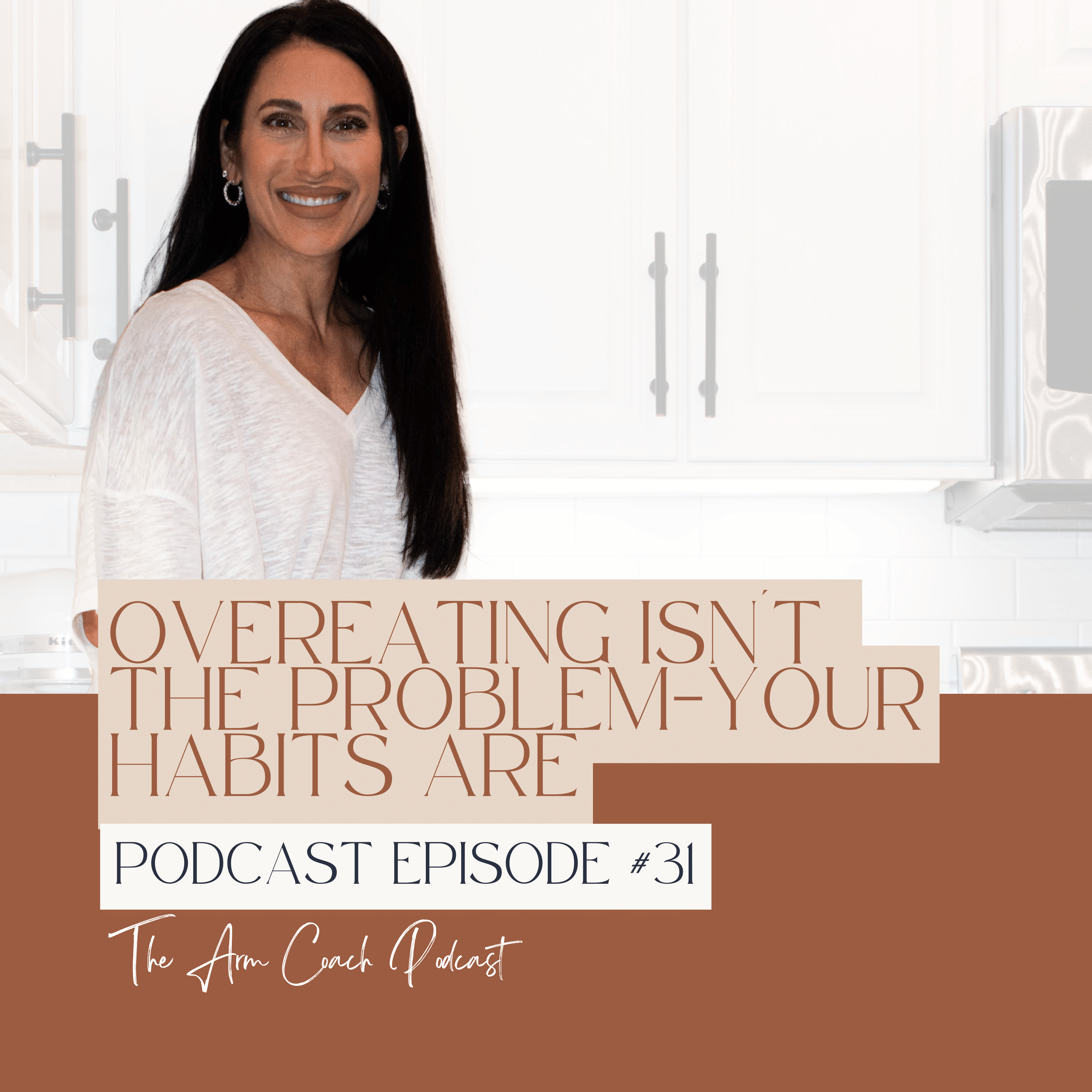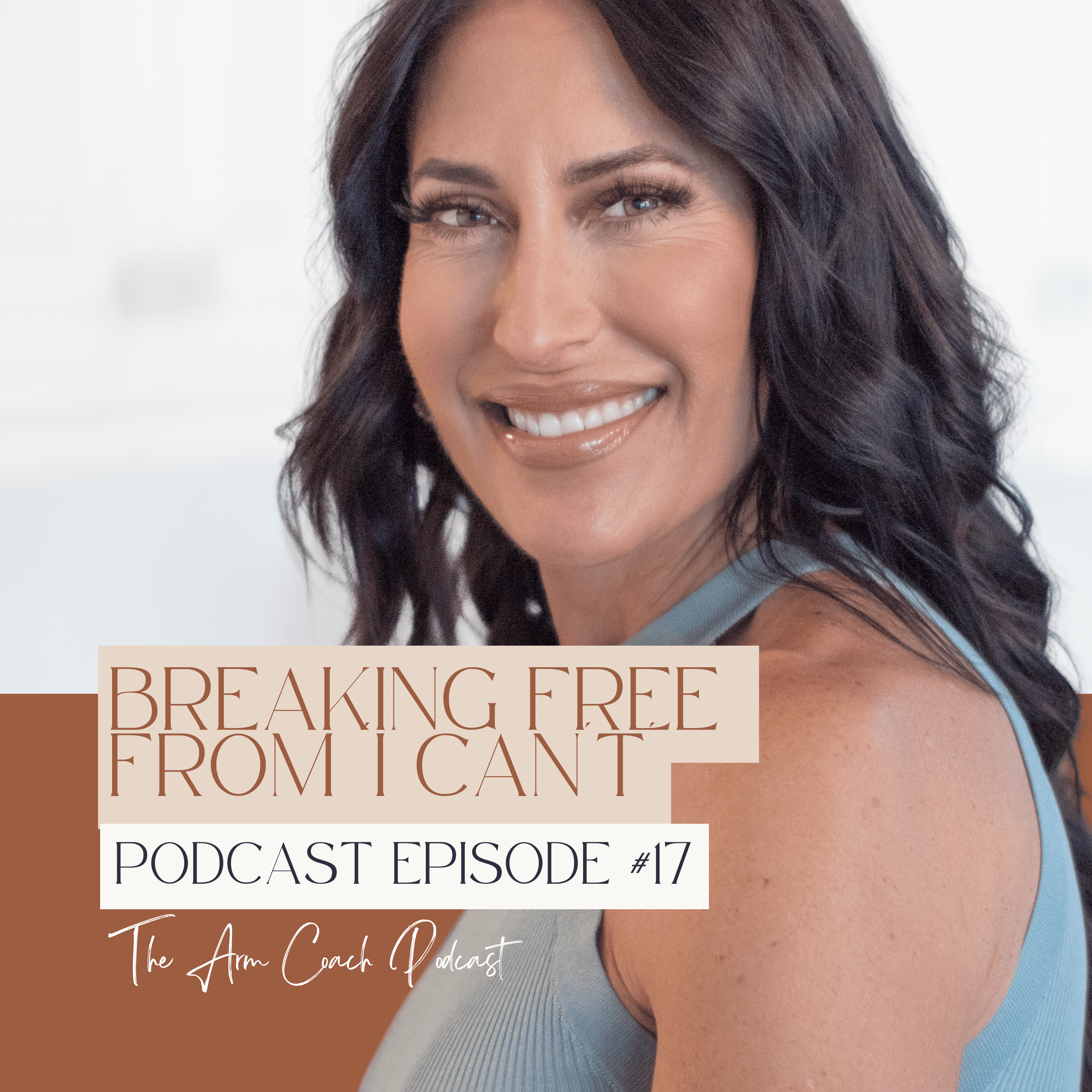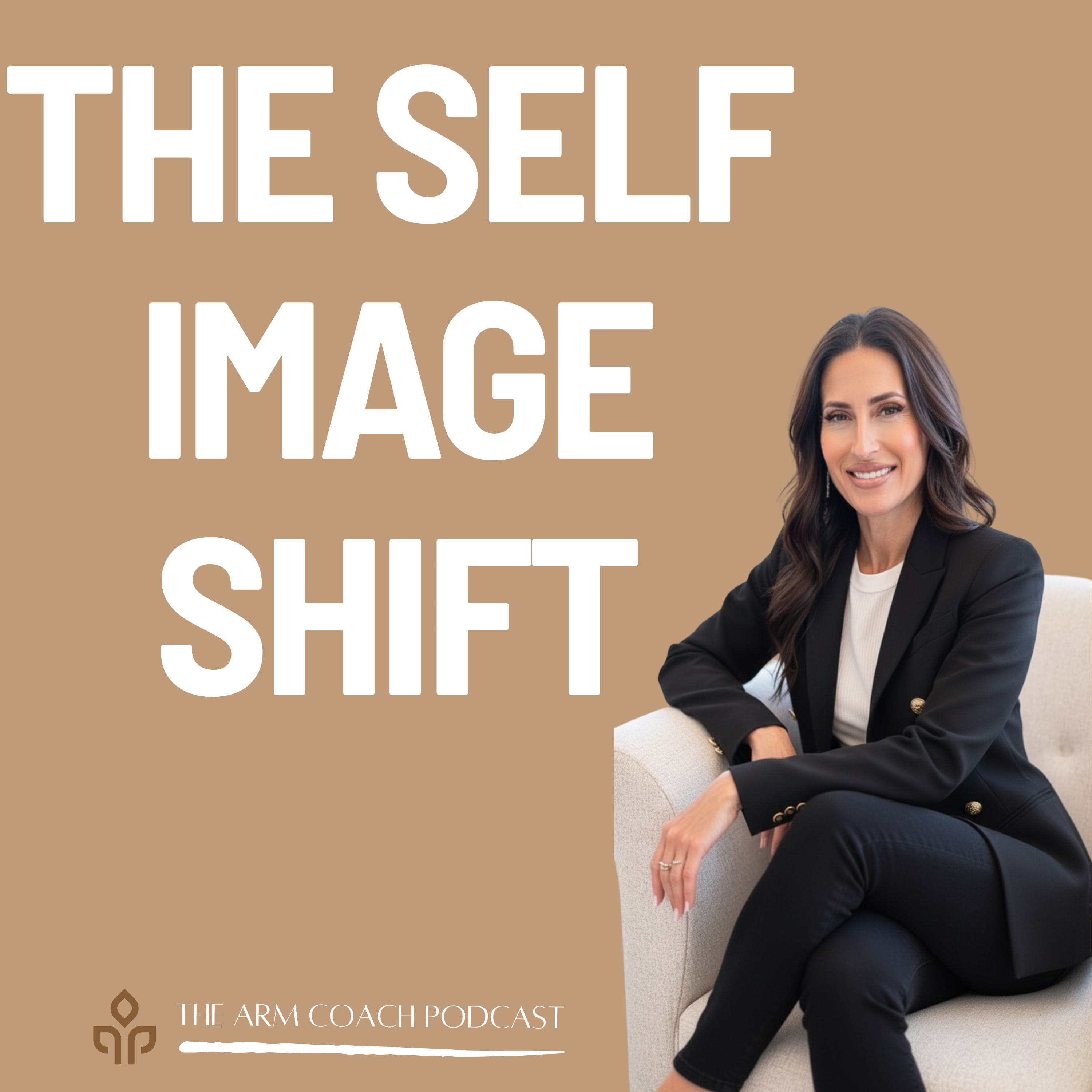Episode Transcript
Do you aim for perfect? Or do you aim to do things better
than you’ve been doing them?
If you aim to be better, you’re in luck! Aiming to be better is the
proven way to make changes in your life.
Today’s podcast will coach and teach you how to develop a
winning mindset that will help you achieve your arm goals,
whether it’s to end your overeating, bust through your resistance
to lifting weights, or leave your procrastination in the dust.
Hi, everybody, and welcome to The Arm Coach podcast, episode
#34.
Before we dive in, I’m super excited to share something special
that will transform your holidays into a season of joy, health, and
confidence.
As we all know, the holiday season can be a whirlwind of festive
treats and gatherings. But guess what? You can still enjoy all the
fun without losing sight of your fitness goals! That’s why I created
my program, Armed for the Holidays!
In just three days, I’ll give you all the tools and resources you
need to stay on track with your nutrition and fitness—even with all
the holiday hustle and bustle. Whether you're in your 40s, 50s,
60s, or beyond, this program is designed just for you, to help you
feel empowered instead of burnt out and overwhelmed this
holiday season!
If this sounds like you, you can grab the program at a super
discounted price in the podcast description of this episode.
Ok so our subject for today is why aiming to do better than you
used to, works more than aiming to be perfect. This is true in life,
but it's especially true in fitness, weight loss and anything related
to changing your habits. Let's talk about this because if you're
anything like my clients, or like me, I'm willing to bet that at least
at some point, your goal was to not only to change your arms
and stop overeating, but to do it perfectly. And that my friend is
the problem. So get comfortable, because we're about to dive
into this subject, why better is the new perfect, especially when it
comes to changing your arms.
Why do we all wish we could do things perfectly anyway? Well I
think we all grow up with a fairy tale for everything. Every
example we have of anything that we aspire to, comes with a
vision of what perfection would look like. We always think about
the ideal. We don't just want to do well, we want to be best. We
want to be the best, top of the class, head of the line, highest
rated one in your department at work, the best student. We just
want to be best. Even when clients start with me, I know that it's
kind of a secret wish for a lot of them, to want to be my best
clients. To do the best. No slips, no fails, no falls. They just want
to be perfect. And you have fantasies of you not only not having
your problem anymore, which is a good fantasy, but your
fantasies may include you racing to that finish line with
perfection. No problems, just that straight line up. So, the image
of you being perfect in whatever you're working on, it’s exciting,
it may feel motivating. When you picture yourself in your new life
and your new body, it’s thrilling because of the feelings that it
evokes when you think about that. You get feelings right? Those
feelings of you doing everything incredibly well. It feels good. Do
you remember when I talked about the miracle question? It's a
way of letting yourself imagine you, without your arm problem.
Now sometimes it's hard to visualize yourself without any arm or
eating issues, because maybe you've had them for most of your
life, like many people have. So it's hard to imagine yourself
without them. Well the miracle question is a good way to
suspend disbelief. When you have a good vision of how you may
be in the future, without that extra arm fat and flab or the eating
issues, then you could feel the emotions you would have if you
got to your goals. So those imagined feelings make us excited.
And when we're excited, it's easier to move forward. So, you pick
a plan, you lay it out, you get started, and then life happens. And
voila! You fail. Uh oh, not perfect. And you blame yourself and
you stop. And that's all you look at. You weren't perfect and you
stop. But the problem, is that when you're counting on things to
be perfect and you fail, you have no other plan. So you stop. You
have no traction. You get mad at yourself. And a side effect is
that it may be a while before you start again. You don't learn, you
just stop. Each time you do this it chips away at your soul and
your self esteem. It's damaging. Even when you fail, if you
approach it the right way, you're still gaining, because you're
learning. But unless you learn how to view this differently, you
won't learn, and you won't gain anything. You'll just keep starting
over and over again. In reality, failure is always a step closer to
what you want. But you need to change how you look at it. So
how can you look at this differently when you find that you’re not
perfect? Then what? Well, the thing to do is to look at and
change your mindset. Your mindset is the way that you view the
world, and in particular, your world. Now, Stanford University
psychologist Carol Dweck, you may have heard of her. She wrote
a great book about this and it's called Mindset, The New
Psychology of Success. She defines two different mindsets that
she came across in her research on achievement and success.
And she calls them a fixed mindset and a growth mindset. I was
really fascinated when I read this because right away, I knew that
you and I would be able to apply Dr. Dweck’s research, to your
quest to change your arms and the way you eat and live. So
here's how it works. The view you adopt for yourself and your life
profoundly affects the way you live your life. If you have a fixed
mindset, then you believe that your abilities and your qualities are
all fixed. They are what they are and they will never change. If
you have a fixed mindset, you feel pushed to prove yourself over
and over again. If you have a certain personality, a certain
aptitude, then it stands to reason that you feel driven to want to
keep proving yourself in all different areas of life. Because you
believe that you really can’t change. You can't improve. You can't
get better. That's not true, that's just what you believe with that
mindset. So you take what you've got, and you try to accomplish
what's important, over and over again. You aim for the goal,
right? You aim to do it perfectly, but instead of caring about
learning, you may just want to get what you want. You don't care
if you're doing things better than before. If it's not perfect, it's
almost as if it just doesn't count. On the other hand though, if
you have a growth mindset, you have a really big advantage.
Because with a growth mindset, the way you do things, and
where you are, is just the beginning. Your basic qualities are
things that you believe you can improve. You believe you can
grow. You can learn. You can do better. So if you fail, you look at
it differently. With a growth mindset, you look at falling down
differently. In our arm goals, with a fixed mindset you tackle a
project, and something comes up that maybe you haven't dealt
with before. Instead of figuring it out, you just accept that you
can't do it, and you give up. You're focused on winning. On
achieving. And in the case of your arm goals, you're focused on
that number of reps or the size of your shirts. And so if you
deviate, if you fail temporarily, you're operating from a fixed
mindset. If you wish for change, and you're afraid to even try,
even stuck in a body that you're not happy with, this is a sign
that you fear that your past results are a predictor of your future
results. And you fear that you'll never change. In fact, if you ever
think ‘I can never change’, that's coming from you thinking in a
fixed mindset. And it doesn't serve you. You think ‘I can't do this.
Something's wrong with me. Maybe it's meant for others, but not
for me’. With a growth mindset, you might think, ‘what is the
problem? How can I solve this problem? What do I need to
learn? And what am I doing that's at least better than before?’.
What is better, versus what is perfect, that's the goal. Because
nothing is perfect. If perfect is your goal, you are destined to fail.
Now the good news is, you could change your mindset. You
could choose to adopt a growth mindset, anytime. Even if you've
been operating under a fixed mindset for a very long time. And if
you do this, then in the quest to tone your arms, as you go
through the process, you'll fail, and then you'll get up and you'll
figure it out. And you'll keep going. And you'll be so much more
likely to get what you want.
So how can you get out of your fixed mindset and into a new
growth mindset, and apply it to your exercise and eating habits?
First some good news. If you consciously adopt a growth
mindset, you'll focus on what will help you move forward. You'll
focus on what you're learning, not the finish line. You'll take pride
in the fact that you're doing better than before. Even if you're not
where you want to be yet. And you can change your mindset,
even in the moment of working on anything in that moment, you
can try on a growth mindset, just to see how it feels. Even if it's
different for you. Even if it feels odd. When you have a growth
mindset, it allows you to love what you're doing, because you're
not just focused on the end goal. You can enjoy the whole
process as a learning experience. Every single skill you have in
your life, from relationships, to how you handle money, to how
you eat, and how you take care of yourself, they all have no
bearing on the skills you start with. On the skills you were born
with. On your talent. Everything you know and do can be
improved.
So here's how. First, you need to learn to hear what your fixed
mindset voice says to you, so that you could recognize it at
important moments. Like when you face a challenge, or when
you run into a roadblock or when you face criticism. Let's say
that you are facing a challenge. You get on the scale and the
number’s the same. And you say to yourself from your fixed
mindset, ‘Are you sure you can do this? Maybe your problems
are different. You know, if you fail, you'll never get back up.
Maybe this isn't for you, because really, what's the point?. If you
hit a roadblock, let's say you go to a party and you're surrounded
by great looking food, but since you ate before you came you
really aren't physically hungry. But you're tempted to eat. Your
fixed mindset is going to say to you, ‘Well now you're in trouble.
There's no way you can resist this. You may as well give in and
restart on Monday’. Let's say that someone criticizes you. And
says something insensitive, like, ‘You know your family is large.
You must just be programmed to be large. You'll probably never
really have the arms you desire.’. Your fixed mindset says to you,
‘You can't do this. You can't overcome your genetics. Why did
you think you could do this.’. That's where you need to recognize
that you have a choice.
And that's point number two.
Recognize that you have a choice. You could take those
challenges and roadblocks and criticisms, and interpret them
differently. You can listen to your fixed mindset voice, and you'll
be focused on all or nothing. You'll be right where you are now.
You'll come up with ways to interpret everything as your inability
to change, because you're not doing things perfectly. Or you can
hit a challenge or a roadblock or get criticism, and you can use a
growth mindset, and just see things as facts. Things you might
want to work on. Or push yourself a little bit more. Things you
might need to grow into. Abilities that you might want to
strengthen. The growth mindset will let you see that you can get
better at what you're doing. And that is your goal. To get better at
managing your emotions, right? To get better at interpreting the
signals from your body, of when you've had enough and when
you have a little more room to eat more. And also to get better at
taking beautiful care of yourself. These things are not fixed, they
can always be learned and improved. And if you give yourself
credit for the small ways you're getting better than before, you'll
be more motivated to keep going. If you compare yourself to
perfect, you stop in your tracks. Pretty familiar scenario. Am I
right?
So now you've learned to hear what your fixed mindset sounds
like when it tells you what to do. You recognize that you have a
choice as to what to do, and how to do it, and how to think about
it. You can think progress and better than before. Or you can
think ‘I failed, I’m not perfect’. But now, what I want you to do,
now that you know what that old mindset sounds like, I want you
to talk back to the things you say from your fixed mindset, with
your growth mindset voice. So when a challenge comes up, the
fixed mindset is going to say, ‘well, maybe this is beyond you.
Maybe you just can't cut it’. And that's how you may usually
think. But I want you to answer with your growth mindset voice.
Which would be something like, ‘Hey, I'm not sure how to do this,
but if I practice, I can figure it out’. The fixed mindset voice says
‘but what if you fail, then you'll be a failure’. But the growth
mindset voice answers, ‘Everybody fails when they learn
something new’. If you hit a roadblock, the fixed mindset voice is
going to say ‘well, if you were smarter, this would have been
easier’. And the growth mindset voice can answer, ‘all smart
people still have to put in time and effort’. And then, those new
growth mindset thoughts, are going to create new feelings, and
you'll take a new growth mindset action on them. It'll get more
and more comfortable, until you change the way you see the
world. And then you'll walk toward your challenges, without fear,
because you won't be afraid to learn and grow and improve. And
you'll recover from any roadblocks because you have a new
attitude. You'll learn and move on and get up. And when you hear
criticism, you'll be able to take it in stride, and continue on your
journey. I want you to focus on each step you're taking. Focus on
what you're doing better, each little step of the way. Focus on
what you're learning. Stop focusing on perfect. And I'll bet if you
start focusing on what you're learning from each misstep you
make, you'll stay on track. You'll keep moving forward.
So the message, the takeaway is, learn. Don't give up. Growth,
not fixed. No stopping. I want you to start applying these
concepts right now. Look at what you're trying to do. Take a look
at the challenges you're dealing with. And for the first time,
instead of saying, ‘This is too hard. I can do this.’, I want you to
start approaching this from the mindset of growth. From the
mindset of ‘How am I better than before? How is what I'm doing,
just a tiny bit better than what I used to do?’. Ask yourself,
‘What's the problem’? What do you need to learn? What do you
need to think, to feel? What do you need to do? Do you need
help? Whatever you need, it's all good, as long as you don't
approach it from that old fixed mindset and say what you used to
say.
I'm going to leave you with this, and I know it's a lot to think
about. Don't go backwards and start judging yourself for the way
you've approached your exercise and eating in the past. But from
this point forward, your goal is to open up to thinking differently.
And I know for sure that you can do this. So that said on this
subject for now, focus on how you were better today than
yesterday. And keep going.
I hope to see you back next week, where we'll continue to work
on not only your goal of toned arms, but learning to think and feel
differently, so you can take action and make lasting change. And
that is our ultimate goal.


